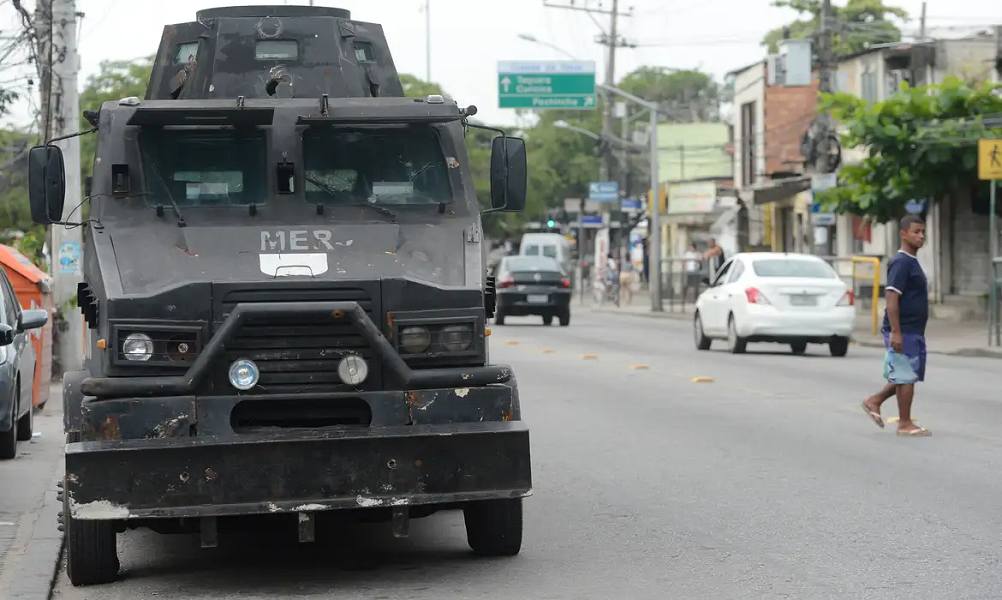An operation launched on Monday morning (29/09) in Cidade de Deus and Gardênia Azul, in Rio de Janeiro’s West Zone, the targeted advance of the Red Command (CV) in the region. Civil and Military Police, with support from the Rio Public Prosecutor’s Office (MPRJ), carried out actions to serve 12 arrest warrants and 18 search and seizure warrants. By late afternoon, 22 people had been arrested, including a criminal from the state of Pará. Authorities also seized four rifles, seven pistols, two grenades, and an unspecified quantity of drugs. Twenty-one bus lines had their routes altered due to the operation, while barricades were set on fire, creating significant disruption to public mobility.
This Content Is Only For Subscribers
To unlock this content, subscribe to INTERLIRA Reports.
Operation Summary
The operation resulted in the arrest of 22 criminals, including Juliana Santos, alias “Ju Pará,” who was captured in Belém and identified as a key link between the Red Command (CV) of Pará and Rio de Janeiro. Authorities seized an arsenal consisting of four rifles, seven pistols, one revolver, and two grenades, as well as 15 two-way radios used for communication. A large quantity of drugs was also confiscated, although specific details are still pending. Police removed 10 tons of barricades that had blocked roads, public transportation, ambulances, and garbage collection, and recovered nine vehicles. The coordinated effort involved approximately 200 Military Police officers, who deployed 55 vehicles, including armored units, to carry out the operation.
Arrest of “Ju Pará”
A key highlight of the operation was the arrest of Juliana Santos, known as “Ju Pará,” in Belém. Investigators reported that she was active in drug trafficking in Gardênia Azul, carrying weapons and interacting with local leaders. About a month ago, she returned to her home state, where she had been acting as a liaison between Rio’s CV drug operations and those in Pará. She had previously been arrested for international drug trafficking, having acted as a mule in France, demonstrating her long-standing involvement in organized crime networks.
Expansion and International Alert
During a press conference, Secretary Victor Santos emphasized the international reach of the faction. Authorities noted that countries, including the United States and Italy, are closely monitoring Rio de Janeiro and São Paulo due to transnational drug trafficking links. The faction’s expansion is not limited to Rio de Janeiro; it extends throughout Brazil and abroad. Police investigations indicate that the cells operating in Gardênia Azul and Cidade de Deus play a crucial role in logistics for the faction’s regional expansion. Leaders based in the Penha Complex, in the North Zone of the capital, have orchestrated this expansion, which has resulted in dozens of deaths annually.
Bus Routes Diverted
According to the Rio Operations Center (COR-Rio), the side lane of Avenida Ayrton Senna, heading toward Linha Amarela, was temporarily closed. Rio Ônibus reported that three buses—from routes 315 (Recreio to Central), 368 (Riocentro to Candelaria), and 415 (Caxias to Barra da Tijuca)—were hijacked and used as barricades on Avenida Ayrton Senna near Gardênia Azul. The operation caused the temporary closure of one state school and 16 municipal schools. Additionally, two municipal health units suspended operations temporarily due to the ongoing police activity.
Analysis:
The recent operation in Cidade de Deus and Gardênia Azul demonstrates both the complexity and the scale of organized crime in Rio de Janeiro. The arrest of 22 individuals, including Juliana Santos (“Ju Pará”), illustrates the sophisticated networks linking local drug trafficking factions with other states and even international criminal operations. The seizure of a significant arsenal, communication equipment, and drugs indicates the high level of organization and the potential for violent confrontations in these communities.
From a public security perspective, the operation successfully disrupted the immediate plans of the Red Command (CV) to expand its influence in the West Zone. However, the use of barricades and the hijacking of buses, along with the temporary closure of schools and health units, reveals the broader social and logistical impact of such interventions on civilian life.
Source: G1 [1] [2], Folha de S. Paulo, O Globo [1] [2], CNN [1] [2]




